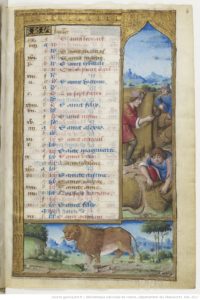
“July”, kalendar page from Les Petites Heures d’Anne de Bretagne (The Little Hours of Queen Anne of Bretagne), by the Maître des Triomphes de Pétrarque. From Bibliothèque nationale de France, Paris (France).
King John objected, and several years of struggle between the King and the Pope ensued. John expelled the Canterbury chapter, and proclaimed all of Stephen’s supporters public enemies. In 1208, Innocent placed England under interdict (basically prohibiting the celebration of the Eucharist). When negotiations failed, Innocent passed a sentence of deposition against John, and put King Philip II of France in charge of executing the sentence (that is, of removing John from his throne).
John caved in 1213, allowing Stephen and his colleagues to return to England from exile. Stephen graciously absolved the king in his first act as Archbishop, but the relationship between Stephen and John remained unpleasant. Stephen joined the struggle of the barons against the king, and between his leadership and the barons’ military strength, John was forced to sign Magna Carta in 1215. (Note that the British do not use the definite article with the name of this document.)
In one of those strange political turnarounds, the Pope now sided with John against the barons. (Because of his capitulation, John held his crown as a fief of the Holy See.) When Stephen refused to excommunicate the barons, Innocent suspended him. Stephen travelled to Rome to appeal the suspension, and the Pope released him on the condition that he stay out of England until peace was restored. By the time Stephen returned to England in May 1218, but Innocent and John had died, and everyone was rallying to support Henry III. Stephen later supported Henry against another group of rebellious barons, and he got the new pope, Honorius III, to agree to refrain from sending a resident legate to England.
Langton made a major contribution to religious life by dividing the Bible into chapters. The Jewish Tanakh (the Old Testament) had long been divided into parashot (the plural of parashah), and his rough contemporary Cardinal Hugo de Sancto Caro also came up with chapter-like divisions. But it is Langton’s divisions which have become the standard divisions in modern bibles. (The division of chapters into verses was the work of Robert Estienne in the 1550s.)
Stephen Langton’s feast day is 9 July, the date of his death.


